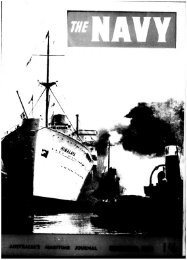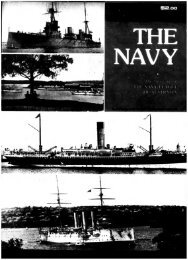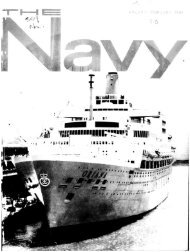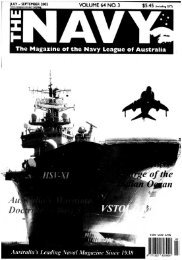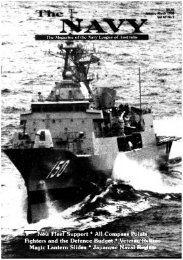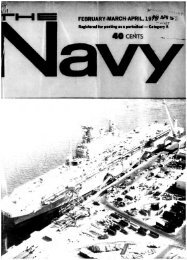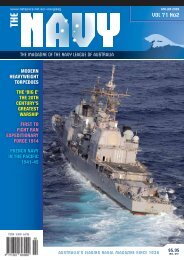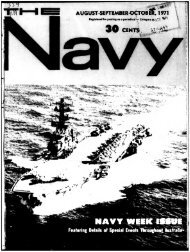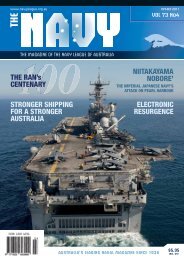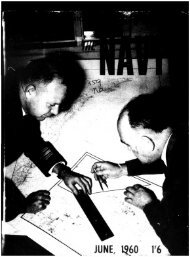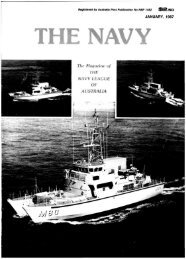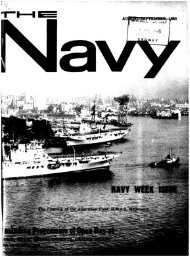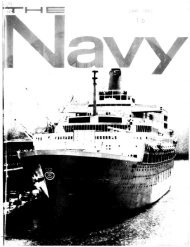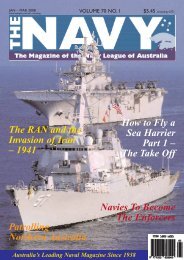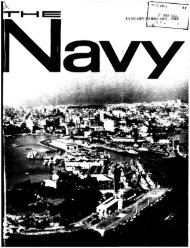VOL 71 No4 - Navy League of Australia
VOL 71 No4 - Navy League of Australia
VOL 71 No4 - Navy League of Australia
You also want an ePaper? Increase the reach of your titles
YUMPU automatically turns print PDFs into web optimized ePapers that Google loves.
SHOKAKU was badly damaged. The <strong>Australia</strong>n/<br />
American task force, including the cruisers<br />
HMAS AUSTRALIA and HOBART, was attacked<br />
by Japanese aircraft, (and then by US Army<br />
aircraft from Queensland), but no ships were hit<br />
and the route to Port Moresby remained barred.<br />
While suffering heavier losses, it was a<br />
strategic victory for the allies, for the Japanese<br />
were forced to withdraw and never again<br />
attempted to enter the Coral Sea in force. This<br />
not only enabled the defence <strong>of</strong> New Guinea but<br />
removed the possibility <strong>of</strong> a Japanese assault<br />
on our east coast.<br />
In July the Japanese began advancing in New<br />
Guinea and also landed troops and labourers<br />
on Guadalcanal Island in the Solomons where<br />
they began the construction <strong>of</strong> an airfield. As<br />
the operation <strong>of</strong> land-based planes from that<br />
The USN carrier USS LEXINGTON on fire and sinking after<br />
the Battle <strong>of</strong> the Coral Sea.<br />
island would have immediately imperilled US<br />
control <strong>of</strong> the New Hebrides (Vanuatu) and<br />
New Caledonia, and thus communications to<br />
<strong>Australia</strong>, the Americans had to eject them.<br />
The Americans threw huge naval forces into<br />
the area. Great losses were suffered by both<br />
sides in a year-long struggle which included ten<br />
major naval engagements, some <strong>of</strong> the greatest<br />
battles <strong>of</strong> the war. During WW II the US <strong>Navy</strong><br />
lost four <strong>of</strong> it's largest aircraft -carriers. Three<br />
<strong>of</strong> these were lost in the Solomons area. They<br />
lost 1 0 cruisers worldwide <strong>of</strong> which no less<br />
than eight were sunk in the Solomons. Nearly<br />
6,000 sailors and 2,000 marines were killedmore<br />
men than <strong>Australia</strong> lost in the whole New<br />
Guinea campaign. We owe a huge debt to the<br />
USN for our security in WW II.<br />
The Japanese lost a similar number <strong>of</strong> major<br />
warships as the Americans (about 30), including<br />
two aircraft carriers and two battleships and<br />
their famous ADMIRAL YAMAMOTO.<br />
<strong>Australia</strong>n losses there were the heavy cruiser<br />
HMAS CANBERRA and heavy damage to the<br />
cruiser HMAS HOBART. which was torpedoed.<br />
The victory <strong>of</strong> the USN, with some help from<br />
our navy, including the brave and invaluable<br />
coastwatchers, and our air force, in the Coral<br />
Sea and the Solomons ensured the safety <strong>of</strong><br />
<strong>Australia</strong> and it's development as a major base.<br />
Together with the Battle <strong>of</strong> Midway and the<br />
most successful U.S. and British submarine<br />
campaigns, it so weakened the Japanese<br />
fleet that the allies cou ld move steadily to the<br />
<strong>of</strong>fensive and eventually drive to the very shores<br />
<strong>of</strong> Japan. ·<br />
It is to be hoped that this perspective will receive<br />
some attention as the nation remembers<br />
"The Battle for <strong>Australia</strong>".<br />
As to the future, geography to a large extent<br />
controls the possibilities for military strategy,<br />
and doesn't change. Both world wars would<br />
seem to hold major lessons in this regard. From<br />
1788 until1942, as an island, albeit a large<br />
one, we depended on the control <strong>of</strong> the oceans<br />
by Britain's Royal <strong>Navy</strong>, under whose shield<br />
we were able to explore, develop and unite<br />
as one nation. Since 1942 we have depended<br />
largely on the might <strong>of</strong> the United States and<br />
particularly it's most powerful navy.<br />
But the world is changing. Within a few decades<br />
the U.S. may no longer be the only super-power.<br />
Wars still take place, there are many areas <strong>of</strong><br />
tension, and there is now a major increase <strong>of</strong><br />
military power in Asia, particularly maritime.<br />
While clearly today emphasis must be on our<br />
contributions overseas in Iraq, Afghanistan, and<br />
other hot spots, many would caution that. as a<br />
sparsely-populated nation at the centre <strong>of</strong> the<br />
world's ocean's, we should now build up our<br />
maritime capability, in all it's elements, as part<br />
<strong>of</strong> our national insurance.<br />
In the meantime, perhaps still <strong>of</strong> relevance and<br />
interest to a modern island nation, over 95% <strong>of</strong><br />
whose people live within missile range <strong>of</strong> the<br />
sea, is the famous Greek historian Thucidides's<br />
report <strong>of</strong> the speech <strong>of</strong> the <strong>of</strong>ficials <strong>of</strong> the island<br />
<strong>of</strong> Corcyra (Corfu) to the Athenians in 433B.C:<br />
"And then it is quite a different matter for<br />
you if you reject alliance with a naval power<br />
than if you do the same thing with a land<br />
power. Your aim, no doubt, should be, if<br />
it were possible, to prevent anyone else<br />
having a navy at all: the next best thing is<br />
to have on your side the strongest navy that<br />
there is. "<br />
Today many wou ld argue that for islands,<br />
though technology has altered weapons,<br />
tactics, and capabilities, little needs changing in<br />
this philosophy---except to add "an air force. "<br />
..<br />
THE NAVY <strong>VOL</strong>. <strong>71</strong> NO. 4 25



